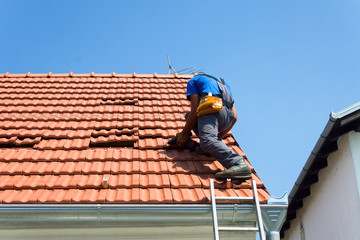Roofers, also known as roof mechanics, install and repair the roofs of buildings. They usually work for a roofing contractor or as independent contractors. Roofers use various materials, including shingles, bitumen, and metal. Their work is physically demanding as they climb, squat, bend, and lift heavy materials.

The installation of roofers is a major task that requires careful planning and preparation. It’s important to move vehicles, cover landscaping with a tarp and place garbage cans as close as possible to the house to catch any debris that falls from the roof. In addition, it’s vital to ensure that all workers wear hard hats and safety harnesses while working on the roof. Even the most careful worker can drop tools or equipment, and this is a hazard that can lead to serious injury if not properly addressed.
Professional roofers install shingles from the bottom and work their way up the roof, which helps to protect it from water damage. They also use a minimum of four nails per shingle and drive them straight down to avoid damaging the granular coating. This practice will result in an even, uniform appearance to the shingles. It’s recommended that a pro roofer install gable-end starter shingles as well, which will help to create a watertight ridge.
Roofers fix and replace the roofing systems on residential and commercial buildings. They may be responsible for installing new shingles, installing a new waterproof coating, replacing a missing layer of tar or metal, or repairing leaks. They also conduct inspections of the roof and use tools for the job. They are exposed to dangerous materials and worksite hazards in the field, so they wear clothing tailored to their environment and protect their skin from cuts and scrapes.
Before you can start repairing your home, you need to find the problem. The best way to do that is with a good inspection. Look for the telltale signs of damage – cracked shingles, pooling water, or leaks – and then make an informed decision about what needs to be done. If your roof is older, it might need more comprehensive work. This will cost more, but you might save money in the long run by avoiding expensive repairs down the road.
Roofs play a vital role in the lives of homeowners, protecting them from wind, rain, and extreme temperatures. Fortunately, they also need maintenance in order to keep functioning well. Performing routine inspections and cleaning is key to maintaining your roof system’s integrity. This will prevent more serious issues from occurring in the future, which can lead to significant costs.
Regular inspections can uncover many problems, such as rusting on flashing or missing shingles. This will allow the roofer to make repairs and replacements if they’re needed. Aside from preventing problems, a proper maintenance plan can also save you money in the long run. This is because small repairs can be more affordable when they’re discovered early. In addition, a properly maintained roof will last longer than one that hasn’t received regular maintenance. This means you can enjoy more savings, peace of mind, and energy efficiency for years to come!
Roofers repair and replace roofs, which protect buildings from moisture. They work with a variety of materials, including shingles and metal. Roofing work can be physically demanding and is often performed in harsh weather conditions. They must be able to climb, bend, kneel, and lift heavy items.
A leaking roof can damage ceilings, walls, and furnishings. A roofer needs to be able to identify the cause of leaks and provide solutions that will resolve the problem. Job duties include removing old roofing material, using hammers, ladders, and scaffolding to complete roofing jobs, and following safety guidelines. They also clean their work areas and equipment.
Roofers must properly understand how to install roofing materials, such as shingles. They also need to know how to repair any damage caused by the installation of the roof. Many people do not realize that the roof can leak. To avoid such a problem, roofs must be inspected often, especially if installed before the rain storm.
Roofers should always have a contract with the roofer, which outlines all aspects of the job. The contract should include the materials, methods of installation, and any special requirements needed. Contractors also need to have insurance in case of any damage during the installation process. You should also check with your local building regulations to ensure that all roofing methods or products are legal and up to code.
